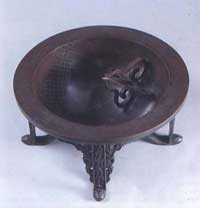
1-4. Specifications of Taekwondo
Philosophy
Then what specifications should a theory get in order to be a good Taekwondo
philosophy or a martial art philosophy? I'd like to suggest the following specifications.
The first is the identity restriction. This item suggests any theory of martial
arts should get its proper contents which can identify it as a theory of martial
arts, and not as a part of another general theory or its by-product. In order
to satisfy this restriction the main part of the theory should focus on the
martial arts themselves at first. That is, it should discuss directly the skills
and the experience of martial arts, and their structures comprehensively and
systematically. Only after understanding of a martial art itself philosophical
concepts can be selected and related in appropriate way according to the understanding.
For a bad example, we can consider a case that we consider and choose the concept
of yin/yang or Taichi or Buddhism and so on, then press down the structure and
skill of a certain martial art for this conceptual frame ignoring its reality
and actual experience, which should be avoided.
The second is comprehension restriction. Though a good theory of martial arts
should focus on martial arts themselves, its content should not be confined
within discussions of the techniques, yet rather it should increase our understanding
to discuss various subjects related at the same time. For an example, the theory
should be able to answer the question whether the ethics of martial artists
is same as that of common poeple or not, and what points it is more significant
in if it were different, and furthermore, it should be related in proper way
to the universal problem of what is the life, from the perspective of martial
art.
 |
|
<Angbuilgwi,
the Sunlight watch of Choseon Dinasty> -Every theory should be based
on rationality.-
|
The third is productivity restriction. The most ideal theory of martial art
is not mere understanding of martial art but also should it drive another philosophical
or scientific theories to be more increased with more opportunities to find
new kinds of solutions. For examples, the problem of mind and body which has
been a classic subject in physical education, and further the definition of
education from a viewpoint of education philosophy, or what is the essence of
life and so on.
It would be very difficult for a theory to satisfy all of these three restriction,
but they will be helpful for us to develop philosophical theories over relativistic
chaos and to devote ourselves to efficient effort for that development if we
establish explicit standards of virtues of martial art philosophy. The third
item can be said to be a quite positive one that every theory cannot be expected
to satisfy since at the beginning of development of a theory. So we may admit
a theory as a comparably good theory when it satisfy the first and second items
only from the conservative point of view. And we can also think of one more
item, i.e. "rationality restriction" that those three element should
be satisfied in rational way in a theory. But this restriction is what every
theory is supposed to satisfy necessarily prior to discussions of restrictions
of martial art philosophy. So I deleted it as specifications for a good martial
art philosophy.(For an example, the essential problem of the second group of
theories I've categorized at the beginning is that they don't satisfy the rationality
restriction.)
|